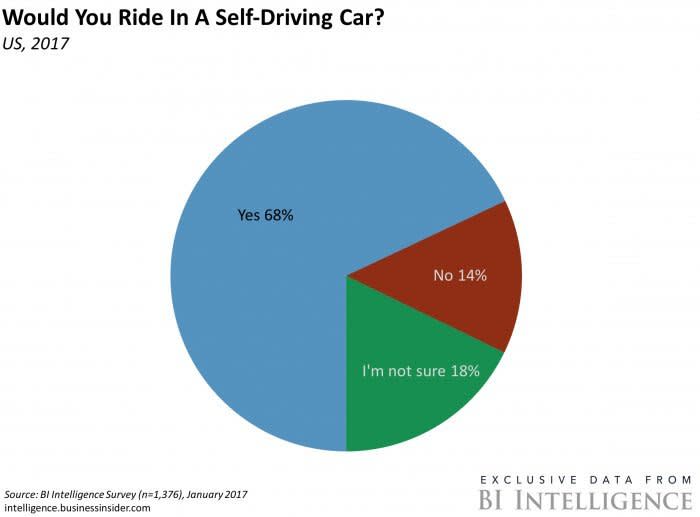A driverless shuttle is ferrying passengers in London

BII
This story was delivered to BI Intelligence IoT Briefing subscribers. To learn more and subscribe, please click here.
An autonomous shuttle developed by Oxbotica, a robotics research firm that has performed vehicle tests in the UK, will begin extended trials on a route in London, reports the BBC.
The shuttle is part of a research project led by the Transport Research Laboratory and Royal Borough of Greenwich. The primary aim of this program is not to test out technology or gather data for improving products, but rather to expose the public to autonomous vehicles to build up familiarity with the technology and begin to normalize the experience.
Over the next few weeks, the shuttle will carry 100 passengers along a two-mile route along the River Thames. The vehicle can seat four people and doesn't feature a steering wheel, brake pedals, or any means of control other than an emergency brake. Each ride will include a trained operator who can stop the vehicle should issues emerge. After the conclusion of the trip, each passenger will be interviewed on the experience of riding in such an autonomous vehicle.
The main point of this trial is to showcase autonomous technology and see how the public reacts to it. More than 5,000 members of the public applied to be a part of the trial and to get a chance to ride on the shuttle, demonstrating an excitement for the concept. This mirrors the findings of an exclusive BI Intelligence survey, which found that 68% of respondents would be open to riding in a self-driving car. People seem to trust autonomous vehicles to be safe, or they wouldn’t be willing to ride in them at all.
Mass transit may be more primed for autonomous disruption than passenger cars or taxis. Transitioning vehicles like buses to autonomous control would involve less change in the passenger experience, as the passenger in a traditional bus is already removed from the driver and doesn't interact with him or her, so the removal of the driver would not have much impact. In a car or a taxi, a rider is seated very close to the driver, so the transition to an autonomous system would transform the experience and change what it means to ride in a taxi. This is why companies and municipalities around the world are pushing forward with autonomous bus and shuttle tests in Las Vegas, Singapore, and Australia, advancing the technology and setting the stage for commercial and governmental deployments.
The self-driving car is no longer a futuristic fantasy. Consumers can already buy vehicles that, within a few years time, will get software updates enabling them to hit the road without the need for a driver.
This autonomous revolution will upend the automotive sector and disrupt huge swaths of the economy, while radically improving energy efficiency and changing the way people approach transport around the world.
Automakers and tech companies are racing to develop the technology that will power self-driving cars in the coming years. That tech is advancing, but leaves observers with a bigger question: will consumers trust driverless car tech, and will they want to use autonomous cars?
Peter Newman, research analyst for BI Intelligence, Business Insider's premium research service, has compiled a detailed report on self-driving cars that analyzes the market, and forecasts vehicle shipments and market penetration. It also profiles the players expected to take on a prominent role in the autonomous future, examines the barriers to autonomous car development and adoption, and reviews developments in technology, regulation, and consumer sentiment. Finally, it analyzes the impact the introduction of autonomy will have on various industries and transport trends.
Here are some of the key takeaways from the report:
Self-driving cars are coming; there will be fully autonomous cars on the roads in the US in 2018, and adoption will just take off from there.
The technology is developing swiftly to allow fully self-driving vehicles, while the regulatory environment is adapting to the anticipated changes that this new technology will bring.
We conducted a survey asking our exclusive BI Insiders panel about their thoughts on self-driving cars, the future of the automotive industry, and the impact autonomous vehicles will have on their purchasing habits moving forward. The results provide a picture of consumer sentiment at the precipice of the autonomous era.
In full, the report:
Sizes the current and future self-driving car market, forecasting shipments and projecting installed base.
Explains the current state of technology, regulation, and consumer perception.
Analyzes how the development of autonomous cars will impact employment and the economy.
Interested in getting the full report? Here are two ways to access it:
Subscribe to an All-Access pass to BI Intelligence and gain immediate access to this report and over 100 other expertly researched reports. As an added bonus, you'll also gain access to all future reports and daily newsletters to ensure you stay ahead of the curve and benefit personally and professionally. >> START A MEMBERSHIP
Purchase & download the full report from our research store. >> BUY THE REPORT
See Also:

 Yahoo News
Yahoo News 

